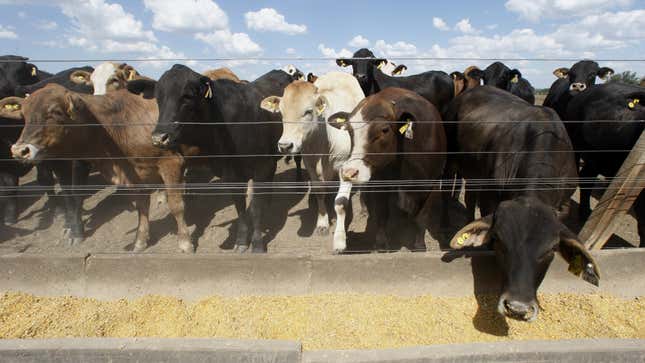The novel coronavirus that causes Covid-19 has brought United States meat production to its knees.
In 2019, the US produced more than 103 billion pounds of beef, pork, and chicken, about a fifth of which was exported—both records for the nation. But as workers in several of the biggest US meatpacking plants have fallen ill with Covid-19, many production lines have been halted, changing the fortunes of meat producers in 2020 and even beyond. Daily slaughter rates have decreased by more than 25%, raising the specter of meat shortages and dampening US competitiveness in international export markets.
And with an eye on a weaker US meat system, meat producers in foreign countries have begun to make serious headway in selling their products to US-based consumers. If they succeed, it could wind up altering how Americans eat meat for decades, experts say.
“This is the Black Swan event that shows how fragile the system really is,” says Christopher Leonard, author of The Meat Racket, which documented the consolidation of the US meat system.

How we got here
The key reason why the US meat industry is struggling with the virus has everything to do with how the country’s meat system is set up. In the early 1900s, as populations gravitated toward urban centers and refrigeration systems allowed all types of meat to be shipped further from farms, the American meat system consolidated. Whereas a patchwork of local farms and feedlots had once supplied the US with a majority of its meat, the system became reliant on just a handful of massive feedlots and meatpacking plants.
Today, between 80% and 90% of the US beef supply is manufactured by four multinational companies—Tyson Foods, Smithfield Foods, JBS USA, and National Beef Packing Company—and accounts for most of the meat consumed in the US.
The virtue of the system is that it’s incredibly efficient. Huge numbers of animals are fattened together on a handful of giant feedlots, then marched into one of just a few massive slaughtering operations where they are systematically killed, broken down, packaged, and shipped to restaurants and grocery stores across the country. The downside is that if anything happens that requires any of the plants to unexpectedly halt production lines, it could have an outsized impact on the larger system. That translates to shortages that can be felt acutely at the consumer level.
“It really brings into stark relief the word ‘efficient,'” Leonard says. “It’s an economic term that has really described the profitability of production. What they’ve done at the same time, however, is really degrade the system’s resilience.”

How Covid-19 disrupted things
As of late April, among the 130,000 people who work in meatpacking plants, there have been 5,000 confirmed cases of Covid-19, which have led to 20 deaths, according to a report by the US Centers of Disease Control and Prevention. That means 115 US meatpacking plants across 19 states have had to take steps to avoid further sickening their workers.
The situation forced the leading meatpackers to temporarily shut down several plants, accounting for some 25% of domestic meat production.
“As it stands today, the pork industry is operating at 50% utilization and beef maybe 50%-70%,” said Credit Suisse analyst Robert Moskow in a May 5 report on Tyson Foods’ plant activity.
It’s become clearer to giant meat processing companies that the way labor is structured inside their own plants is unsustainable while the threat of the virus lurks. As carcasses roll down assembly lines, employees often work shoulder-to-shoulder to cut the meat and remove bones. Under the current setup it’s impossible to effectively social distance while on the job, and that increases workers’ chances of contracting the virus. To accommodate social distancing, the big meat processors may have to give up the hyper-efficient operations that allowed them to become dominant in the first place.

The leaders of these giant meat processors have sounded the alarm to the general public. Taking out a full-page ad in the weekend edition of The New York Times, the chairman of Tyson Foods warned that “the food supply chain is breaking,” and added that “there will be limited supply of our products in grocery stores until we are able to reopen our facilities that are currently closed.”
In his own April 12 statement, the CEO of Smithfield Foods described the situation in dire terms as well. He noted that the virus has pushed “our country perilously close to the edge in terms of our meat supply.”
In one of Smithfield Foods’ biggest plants in Sioux Falls, South Dakota, work halted in mid-April (it went back online about a month later). That plant alone represented about 5% of total US pork production; when it’s operating at full capacity, it churns out 18 million servings per day.
With so much of its meat production halted, the US is staring down a situation it rarely faces, one in which it isn’t producing enough meat to meet demand in its own market. On May 4, the number of cattle slaughtered per day (pdf) was down 36%, from 118,000 to 75,000, compared to the same time the prior year. Among US pork producers, the numbers are similar. Daily slaughter of pigs (pdf) was down 37% compared to the same time the prior year, from 468,000 to 292,000.
In some cases, the change will be noticeable at the grocery store level, where consumers may very well find meat cases uncharacteristically empty. And in cases where product is available, the prices will likely be higher than usual. Less pork and beef product means prices in the grocery store will rise, potentially impacting who can buy.

Politics adds heat to the global markets
When the world’s second-largest producer of meat (China is the first) is hobbled, it leaves an opening for other countries to potentially expand their market share. Already, the world’s third-largest producer of meat, Brazil, is looking to take advantage.
On April 28, São Paulo-based JBS announced that it could scale up its operations in Australia and Brazil—which haven’t been hit as hard by the virus as in the US—to ship more meat into the US market to make up for the shortage.
It’s a politically interesting move for meatpackers in Brazil, which only in February regained access to the American market after a three-year ban. In 2017, the US Department of Agriculture’s Food Safety and Inspection Service closed the borders to Brazilian beef over food safety concerns because of sanitary conditions in Brazilian meatpacking plants. The agency lifted the ban after on-the-ground inspectors said the safety issues had been resolved. Now US meat groups, including the US Cattlemen’s Association (USCA), are upset about the reversal.
“USCA is stunned by the recent decision to risk the health of our domestic cattle herd and jeopardize the safety of consumers by allowing the importation of fresh beef from Brazil,” the group said.
The US meat system is staring down a harrowing set of circumstances. Workers in meatpacking plants around the country are reluctant to clock-in to jobs that expose them to a dangerous virus. As a result, domestic meat production is hitting a snag, leaving an opening for a foreign producers to make headway in the US market.
And US-based cattle ranchers should be concerned that they’re losing ground, Leonard says. Because of the way the virus has hobbled the US meat system, any inroads Brazilian beef makes into the market would be tough to reverse. Changing supply chains doesn’t happen overnight.
In late April, in an effort to resolve any impending meat shortages, US president Donald Trump decided to use war-time powers to force meatpacking plants to remain open. It’s a move that may wind up creating an even bigger problem by increasing the cases of Covid-19 among factory workers, further kneecapping production. Shortly after Trump’s announcement, Democrat lawmakers in the US House of Representatives asked USDA secretary Sonny Perdue to explain exactly how the White House intends to ensure workers have protections from getting sick (pdf), details that weren’t included in Trump’s order.
The overall impact the virus will have on the world’s food supply network remains to be seen. But if meatpacking plants keep having to close as workers are stricken with the virus, it won’t spell out anything good for US agriculture.
Could the US change its food system once the pandemic ends to make meat production more resilient? Leonard says he isn’t optimistic that the meat system will drastically reorganize its current setup.
“Turn the clock back to 2008, we had a Black Swan event in the US banking system, and the two biggest banks ended up on the other side even bigger,” he says, adding that changes in the US meat system over the last century would be hard to reverse.
“Once you tear apart the supply chain and the machinery that was there before, it’s really hard to replace it,” Leonard says. “Lots of viable producers have been put out of business over the years. Rebuilding that is really hard once it’s gone. We really are in a dilemma of what’s on the other side of this crisis.”
